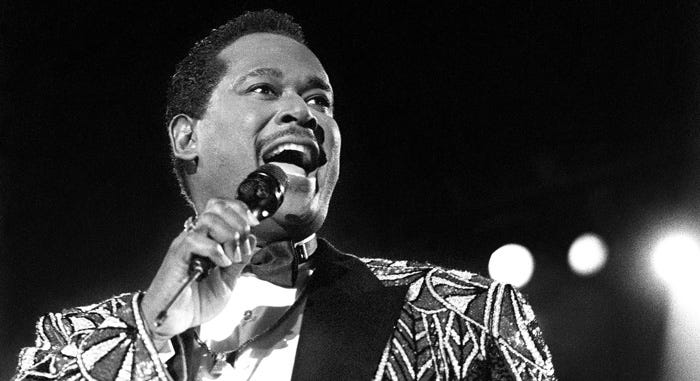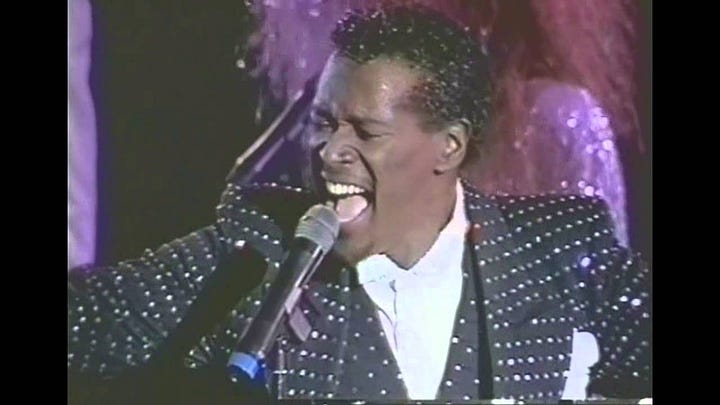

His vocal control was unrivaled.
If you need any iota of evidence, please listen to this live recording, from 2003, of Luther Vandross singing “A House Is Not A Home” at Radio City Music Hall.
He could do things with his voice that we’re not used to hearing from anyone other than, perhaps, opera and jazz singers; much of his catalog shows that (without necessarily showing off), but hearing him live proves it without a doubt.
His tone, too: magnificent. The way he could sing out, sing loudly and largely without yelling, while still hitting every single note, caressing and holding them close. He could make you feel as if he were singing just to, only to, you. There was an intimacy to his voice. He was a master, and he gave plenty of master classes on record.
Few singers, particularly in the genre of R&B, were or have been better at taking others’ songs and making them their own. This isn’t to say he made you forget the originals, but that his takes were often so distinctive to make these, almost, new songs. From Stevie Wonder’s “Creepin’” to Heatwave’s “Always and Forever,” not to mention the many Dionne Warwick songs he took on - when you hear his versions, they don’t feel like remakes. They’re Luther’s, whether he originated them or not. Case in point, his version of Bonnie Bramlett and Leon Russell’s “Superstar,” originally recorded by Delaney & Bonnie, and made famous by the Carpenters. But Vandross pulled the song like taffy, made it glacial (and sang it as a medley with Aretha Franklin’s “Until You Come Back to Me”), and brought out even more of the ache than no less a great singer than Karen Carpenter had. His version is devastating, and utterly magnificent.
This is not to say that everything Luther Vandross touched was golden. He had a tendency, especially later in his career, after he’d become a superstar, for schmaltz. His 1994 covers album Songs (most well-known by pop audiences for his “Endless Love” duet with Mariah Carey) should largely be avoided. And his first pop top 10 single, 1989’s “Here and Now,” drips with cheap greeting card sentiment. (Of course it’s become a wedding standard.)
My favorite Vandross album is easily 1985’s The Night I Fell in Love, which he coproduced (as was everything he cut from ‘83-’93) with Marcus Miller. (Side note: Miller has made plenty of his own music as a jazz bassist, and worked with everyone from Miles Davis to E.U. (he co-wrote and produced “Da’ Butt”!), but his musical relationship with Vandross was a special one. He by and large knew the best kinds of songs, and musical settings, for Vandross’s uniquely gifted voice, and understood how best to produce them.) 7 of the album’s 8 tracks make my LV playlist, embedded below (sorry, “My Sensitivity”). From the midtempo, head-nodding grooves of “‘Til My Baby Comes Home” and “It’s Over Now” to the grand, yet quiet balladry of “Other Side of the World” and “If Only for One Night,” this is the long-player where it all comes together. And that’s not even mentioning the sly title track, less a midtempo than a low-tempo, subtly percolating for 6 minutes. The way Luther sings lines in the quasi-chorus, with a crew of female vocalists responding with the song’s title phrase akin to, well, a Greek chorus: it’s just so smart, so unexpected. Unsurprisingly, Vandross and Miller co-wrote it; this pair knew just what they were doing.
And I’ve not even mentioned his duets. He sang a lot of them; for someone with such a distinctive voice, he was incredibly gifted at pairing his voice with another’s. Some of my favorites include 1982’s Marvin Gaye/Tammi Terrell cover “If This World Were Mine” with Cheryl Lynn, 1987’s R&B #1 “There’s Nothing Better Than Love” with Gregory Hines (yes, Gregory Hines - Vandross produced an entire, self-titled album for the actor/dancer, released the following year), and - you’d think this wouldn’t work, but it does - 1992’s Jimmy Jam & Terry Lewis-produced “The Best Things in Life Are Free,” with Janet Jackson. Just listen to the glorious way LV just floats over Jam & Lewis’s new jack swing.
What maybe mattered most about Vandross, however, was a major feature of his epic voice: the ache. This was a singer who knew pain, who understood heartbreak. I suspect a big part of that revolved around the fact that he was known to be a deeply closeted gay man. Which gives a real added poignance (and gutpunch, frankly) to lyrics like “I won't tell a soul, no one has to know/If you want to be, totally discreet” - which, fascinatingly, weren’t written by Vandross himself, but by Brenda Russell, in “If Only for One Night.” That said, it would seem rather… obvious why he’d choose to record a song like that. A way to be out without being out, as it were. Then there’s these lines from 1983’s “I Wanted Your Love”:
“Oh, but when the lights went down and the standing "O" was done
I was just another lonely guy who didn't have no one”
“Thought that I could still be happy even though she wasn't you
We had told the world we were going to ring the wedding bell
But when I really thought about it, I was really lying to myself”
Oof.
Sometimes he sang about female romantic interests, yeah - his “friends” in the song even make a reference to him forgetting “about that girl” in the second verse - but at others he seemed to come so close to coming out in song. Sadly, he was an expert at code-switching. And this isn’t even a ballad, it’s an uptempo record! But even then, the ache in his voice is palpable.
I miss Luther. I wish he’d lived longer, made more records, maybe even come out. (I mean, Barry Manilow finally did, so — ?) I’m grateful for what he left us. Happy birthday, Luther.



Your description of his take on Superstar may be one of the best descriptions of a vocalist making a song their own I've ever read. Thank you for remembering Luther in this way.